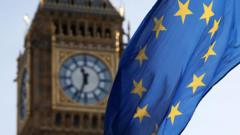The UK and EU are gearing up for their first bilateral summit since Brexit, marking a crucial moment in their evolving relationship. Despite the historical tensions caused by the UK's departure from the EU, officials suggest that the urgency of global issues like the Russia-Ukraine conflict and shifting alliances have driven these powers toward collaboration. Experts anticipate outcomes such as a joint declaration on foreign policy priorities, a security and defence pact, and measures to alleviate post-Brexit trade barriers.
**UK and EU Set to Forge New Ties at Pivotal Summit Amidst Post-Brexit Challenges**

**UK and EU Set to Forge New Ties at Pivotal Summit Amidst Post-Brexit Challenges**
As the UK and EU prepare for their significant summit on Monday, officials indicate that intense negotiations over key issues—defence, trade, and migration—will dominate discussions.
In the lead-up to this pivotal meeting in London, European leaders, particularly from France, have exerted pressure regarding the negotiations. Recent developments, such as the UK’s invitation for French President Emmanuel Macron to a state visit at Windsor Castle, demonstrate attempts to foster goodwill. Analysts believe the summit's agenda will focus on reaching a common understanding, even as French interests—such as fishing rights and EU defence contracts—remain contentious.
Key announcements expected include plans for a security and defence agreement, reflective of both parties' interest in unity amid global tensions. Discussions around trade will tackle the ongoing complexities introduced by Brexit, with the UK pursuing a sector-by-sector approach to reduce tariffs and improve trade relations without relinquishing its stance on EU membership frameworks. The UK wants to achieve this without compromising on its customs union red lines, despite popular support for improved trade with the EU among voters.
The anticipated mobility section of the summit is another significant component, which aims to promote the recognition of professional qualifications across borders and expand travel opportunities for young people. However, this coincides with the UK government's firm stance on reducing immigration, highlighting the balancing act domestic policymakers must navigate.
As the EU faces internal debates, particularly influenced by its member states’ competing interests, securing cooperation from both factions remains paramount. Particularly, France's stringent stance on defence contracts can lead to friction, as its push for protecting local industries contrasts with the UK's wish to engage in European defence projects following its robust stance on the Ukraine crisis.
Overall, while the UK and EU are on the cusp of forging stronger connections at the summit, the success of this collaboration hinges on complex negotiations and domestic pressures that threaten to complicate relations.
Key announcements expected include plans for a security and defence agreement, reflective of both parties' interest in unity amid global tensions. Discussions around trade will tackle the ongoing complexities introduced by Brexit, with the UK pursuing a sector-by-sector approach to reduce tariffs and improve trade relations without relinquishing its stance on EU membership frameworks. The UK wants to achieve this without compromising on its customs union red lines, despite popular support for improved trade with the EU among voters.
The anticipated mobility section of the summit is another significant component, which aims to promote the recognition of professional qualifications across borders and expand travel opportunities for young people. However, this coincides with the UK government's firm stance on reducing immigration, highlighting the balancing act domestic policymakers must navigate.
As the EU faces internal debates, particularly influenced by its member states’ competing interests, securing cooperation from both factions remains paramount. Particularly, France's stringent stance on defence contracts can lead to friction, as its push for protecting local industries contrasts with the UK's wish to engage in European defence projects following its robust stance on the Ukraine crisis.
Overall, while the UK and EU are on the cusp of forging stronger connections at the summit, the success of this collaboration hinges on complex negotiations and domestic pressures that threaten to complicate relations.




















